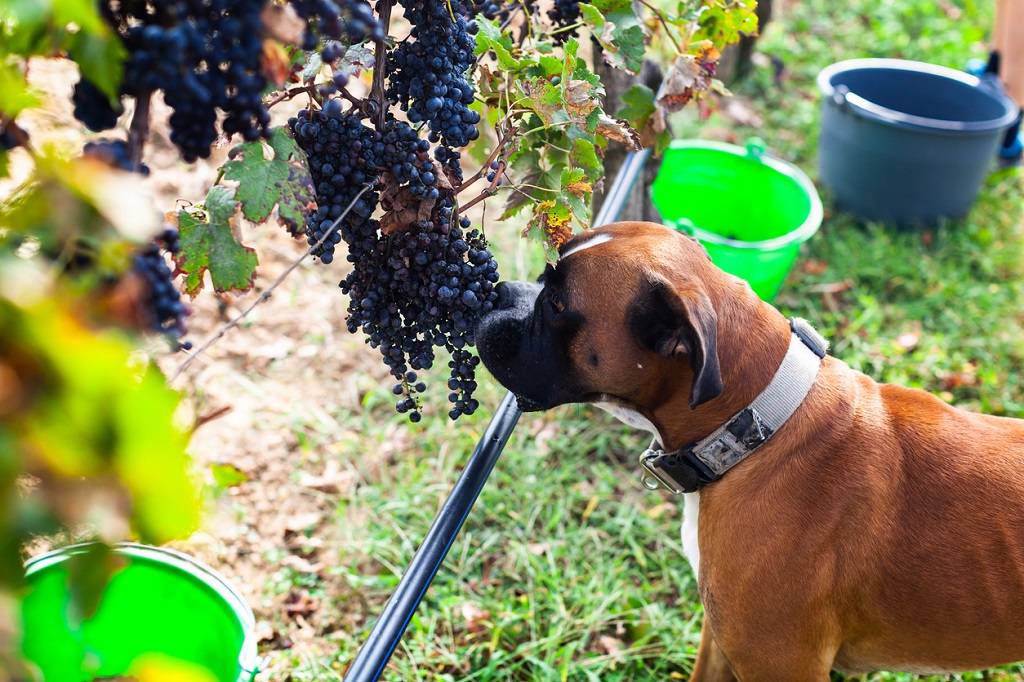For Pups With Short Attention Spans…
You can expect to spend about 10-12 years with your boxer pup. To keep your boxer healthy and happy, consider a good diet, perhaps even a breed specific one, as well as regular exercise and vet visits. Boxers are an active dog with a good number of health conditions to be aware of so always stay on top of your dogs health!
The world’s major religions can agree on one thing—all dogs do go to heaven. 1
But that doesn’t mean we don’t want them to chase squirrels, bark at the mail carrier, and give us kisses on this plane for as long as possible.
Whether you have your eye on a boxer pup at your local animal rescue or you’ve recently adopted this bright, fun-loving, and protective breed, we have the answer to your most pressing question as a boxer parent—how long do boxers live?
Luckily, boxer parents can settle in for the long haul. The average lifespan of a boxer puppy is anywhere between 10 and 12 years.2 According to a recently-updated dog-year calculation system, that’s approximately 68 to 71 dog years!
Unfortunately, average lifespans aren’t always a given, and boxers do have breed-specific health issues that could impact their life expectancy. But there are also various ways to make sure your pup, regardless of dog breed, lives its happiest, best, and longest life. We’ll explore more about both below.
What Factors Affect a Boxer’s Lifespan?
We know that boxers can live to be 10 to 12 years old on average. But, which factors could impact their lifespan? Let’s start digging.
Health Conditions
Like any other breed, boxers face specific health conditions that have the potential to alter their quality of life. Boxer dog owners have to keep a watchful eye out for seven major illnesses and conditions:3
- Hip/elbow dysplasia – Dysplasia usually occurs in larger growing dogs such as Great Danes and Bullmastiffs—if they grow too quickly, their joints may not develop as fast as their bones, leading to discomfort and trouble walking.4
- Hypothyroidism – The thyroid is the thermostat of your dog’s body (humans have one, too!). But, if your boxer’s thyroid doesn’t produce enough hormones, these deficiencies could impact their energy level, weight, skin, coat,5 and even their chances of contracting a major health problem!
- Aortic valve disease – Before distributing oxygenated blood to the rest of the body, blood travels through the left ventricle of the heart to the aorta through the aortic valve. If the aortic valve doesn’t operate properly, this could cause a variety of cardiopulmonary issues for your boxer,6 including heart disease.
- AS/SAS – One type of aortic valve disease is aortic stenosis (AS). In AS cases, the aortic valve shrinks, causing a heart murmur and other cardiac issues. There are three subtypes of AS, and subvalvular aortic stenosis (SAS) is the most common in boxers.
- Cardiomyopathy – In cardiomyopathy cases, the heart ventricles enlarge, thinning their walls and reducing their power to pump blood. This can cause weakness, weight loss, coughing, and fainting.7
- ARVC – Arrhythmogenic Right Ventricular Cardiomyopathy (ARVC) is a boxer-specific kind of cardiomyopathy. The condition is the result of a specific gene mutation in the breed, and it is found in approximately 40% of all boxers.8
- Degenerative Myelopathy – Degenerative myelopathy (DM) occurs in dogs whose white spinal matter degrades with age, causing limb weakness and (in some cases) paralysis. DM is common as large dogs like the German shepherd age, and it’s similar to human ALS.9
Woof, what a list. While the conditions above seem bleak, remember that not all boxers suffer from them—and those that do can still live long, happy, and active lives.
See Also: Common Boxer Health Issues
Diet
Generally speaking, you should feed your dog as well as you feed yourself—without succumbing to table-feeding, of course (we know those begging eyes can be very persuasive).
So, take a look at the ingredient label on your boxer’s food. Are you feeding your dog the canine equivalent of a home-cooked meal or doggy junk food? High-quality dog food should have the following:
- Wholesome, healthy ingredients like whole grains and meats (not meat meals or byproducts)
- Lean proteins like fish, chicken, or turkey (though pork and beef are also fine for your pup—just watch the food’s overall fat content)
- Meat as the first ingredient (but dog food doesn’t have to be grain-free to be healthy)10
There are many reputable options for dog food perfect for your dog. Always do your own research, but if you need a place to start, try BARK food for Boxers! Pro Tip: Get 25% off with code 25FOOD and free shipping!
Veterinary Visits
You’ve probably heard the saying, “Prevention is the best medicine.”
While we’re not here to debate its validity, the statement makes an important point—visiting healthcare professionals and following their advice can help you avoid or mitigate future health issues. The same is true for dogs, especially boxers.
Since boxers are susceptible to so many health conditions, regularly visiting the vet is critical to your pup’s lifespan. Why?
- A vet can provide preventative care advice even if your boxer doesn’t show any current signs of poor health.
- Some boxer health issues are only observable by a vet—their potential heart issues, in particular (unless you moonlight as a canine cardiologist).
- Your vet can keep small or moderate health issues from becoming major problems.
Exercise
Boxers are high-energy, playful pups—they have a heritage of working as hunting dogs (specifically as game chasers), and they love to run, jump, and chase their favorite ball.1
Without regular exercise, your boxer could become restless, lethargic, or anxious. So, as a boxer owner, what kinds of exercise should you be providing for your pet dog?
- Regular running – Games of fetching, trail running, and chasing other pooches at the dog park are all excellent ways to run off some of that abundant boxer energy.
- Fenced outdoor time – Left to their own devices, boxers can entertain themselves. If you have a fenced yard, consider installing a doggy door to let your boxer come and go as they please.
- Agility challenges – Boxers show lots of success in canine athletics—they love the challenge and speed of an obstacle course. If you have the space, consider setting up a small course in your backyard.
Pet Maintenance
Of course, regular hygiene and care can help your pup live a healthy, happy life. This includes:
- Regular nail trimmings
- Bathing (boxers generally don’t stink, but the AKC recommends once-a-month baths)
- Brushing with a rubber curry brush or hound glove
- Tooth-brushing and dental hygiene
- Ear cleanings
- Collar washing
- Regular flea, tick, and heartworm treatments
The last item is arguably the most important—talk to your vet about regular medication for fleas, ticks, and heartworms. While these are easily prevented with medications, they can cause serious or even life-threatening problems (in the case of heartworms).
Tips for Helping to Extend Your Boxer’s Lifespan
All of the factors above can impact your boxer’s lifespan. But can you do anything to extend it? It’s hard to say, although the following can help keep your dog safe, happy, and healthy for years to come.
Keep Hazardous Items Out of Reach
Boxers are energetic—but you have a life, too. When you need to leave your boxer at home, make sure that:
- They have plenty of toys to play with
- They’re getting the exercise and engagement they need
- Hazardous items are out of reach
Since boxers can get restless when kept inside for extended periods, they’re liable to “get into” items that are within reach—items left on the kitchen counter or stored in low, unlocked cabinets. Take special care to secure:
- Household cleaning products
- Pro-tip: Start buying non-toxic or plant-based cleaning products for extra safety
- Foods that can be toxic to dogs
- Chocolate
- Avocados
- Grapes
- Personal care products
- Soap
- Tampons
- Makeup


Prioritize Exercise
We know that we’re harping on exercise—because it’s so important for your boxer. There are two reasons why your pup should get as much exercise as they need:
- Boxers have a genetic predisposition for cardiovascular issues. Exercise can improve their heart health and give you an opportunity to look for potential symptoms of any issues.
- Boxers are highly active, and without lots of exercise, their mental and physical health could suffer. Plus, your dog has a higher tendency to start poking around where it shouldn’t if they’re understimulated.
Whether you make sure to fit in at least one game of fetch each day, take regular trips to the dog park, or give your dog free reign of your (fenced!) yard, you’re helping your boxer live a longer, happier, and healthier life.
Spend Quality Time with Them
Boxers are affectionate people-pleasers—when they’re not chasing a ball, they love to snuggle, play games, run through obedience circuits, or simply stand by your side while you cook or clean.
Spending time with their humans provides boxers (and all dog breeds) with vital enrichment. If you’re a first-time dog parent, you might underestimate how important this quality time can be. When you speak to your boxer, they’ll hang on to your every word.
BARK Can Help Your Boxer Stay Active, Happy, and Healthy
Boxers have an excellent lifespan—with the proper care and love from devoted parents like you, boxers can live 10 to 12 years on average. Plus, keeping an eye out for common boxer health issues and taking steps to improve your pup’s quality of life will only improve their time on this planet.
At BARK, giving dogs happy, healthy, and long lives is what we’re all about. We offer subscription boxes, dental care products, food, toys (even extra-durable toys for Super Chewers), and so much more, and your dog will love them as much as you will—probably more.
Everything we do is about making magic for pooches and their parents—BARK makes it almost as much fun to be a dog person as it is to be a dog.
Sources:
- Quartz. Pope Francis Says All Pets Go to Heaven, But What Do Other Religions Say?. https://qz.com/311346/pope-francis-says-all-pets-go-to-heaven-but-what-do-other-religions-say/
- American Kennel Club. Boxer. https://www.akc.org/dog-breeds/boxer/
- American Boxer Club. Testing and Reporting Guidelines. http://cdn.akc.org/Marketplace/Health-Statement/Boxer.pdf
- American College of Veterinary Surgeons. Canine Hip Dysplasia. https://www.acvs.org/small-animal/canine-hip-dysplasia
- Canadian Veterinary Journal. Hypothyroidism in a Boxer Dog. https://www.ncbi.nlm.nih.gov/pmc/articles/PMC341946/
- VCA Animal Hospitals. Aortic Stenosis in Dogs. https://vcahospitals.com/know-your-pet/aortic-stenosis-in-dogs
- Cornell University College of Veterinary Medicine. Canine Dilated Cardiomyopathy. https://www.vet.cornell.edu/hospitals/companion-animal-hospital/cardiology/canine-dilated-cardiomyopathy-dcm
- Upstate Veterinary Specialties. Signs, Symptoms, and Treatment of Arrhythmogenic Right Ventricular Cardiomyopathy (ARVC) in Dogs. https://www.uvsonline.com/arvc-in-dogs/
- VCA Animal Hospitals. Degenerative Myelopathy in Dogs. https://vcahospitals.com/know-your-pet/degenerative-myelopathy-in-dogs
- Pet Product News. New Study Adds Fuel to DCM and Grain-Free Dog Food Controversy. https://www.petproductnews.com/blog/new-study-adds-fuel-to-dcm-and-grain-free-dog-food-controversy/article_b93a1fcc-81b1-11eb-b327-57e8fd4ab0c0.html





